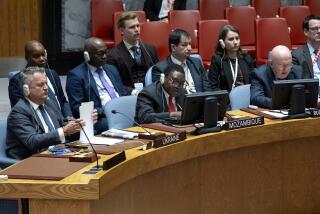Japan to Seek U.N. Security Council Seat
TOKYO — Prime Minister Kiichi Miyazawa will quietly launch an effort to win a permanent seat for Japan on the U.N. Security Council when he attends a one-day meeting this week of leaders from the 15 countries that currently hold seats on the council, according to Foreign Ministry officials.
The effort will be so low-key that it might not even attract public notice, the officials say. But they insist that Japan will be pressing for a permanent “place in the sun” in the United Nations’ highest decision-making body. The goal is to win the prize by 1995, the 50th anniversary of the founding of the United Nations, they added.
Japan was elected last year to a two-year term on the council, but such seats do not have the veto power enjoyed by the five permanent members--Britain, China, France, Russia and the United States.
Miyazawa will unveil Japan’s bid for a permanent seat in a speech calling for the United Nations to adopt reforms recognizing the vast changes that have occurred since 1945, when the international organization was founded by the victorious nations in World War II, the officials said.
With a gross national product that the government predicts will rise to nearly $4 trillion in fiscal 1992, Japan, which in 1945 lay in the ruins of defeat, is now the world’s second-largest economy, after the United States.
The prime minister will refrain from asking directly for a permanent seat, said one of the Foreign Ministry officials, who asked not to be identified by name. Nor will he mention “former enemy nation” references in the U.N. Charter that Tokyo wants eliminated, the diplomat added.
“We don’t like to appear self-serving,” he said.
Miyazawa’s trip to New York--he leaves Thursday and returns Sunday--itself underscores the importance that Japan is placing on the bid. Normally, Japanese prime ministers find themselves unable to leave the country while the legislature is in session. Two separate briefings that were held for foreign correspondents Tuesday also showed the unusual emphasis that Japan is putting on the issue.
“Taxation without representation” will be the theme of the push, a second diplomat said.
“Decisions are now being made in the United Nations without participation by the big contributors who pay for them,” he complained, citing U.N. sanctions against Iraq in the aftermath of its invasion of Kuwait in August, 1990.
Although it did not participate in Security Council deliberations last year, Japan ultimately contributed $13 billion to the U.N.-sanctioned effort in the Persian Gulf, he noted.
“If we have to pay, we have to be involved in the decision-making,” the diplomat said.
There is a growing perception among Japanese that their government is a “cash-dispenser” for other nations’ decisions, and this opinion eventually will deprive Japan of the domestic support it needs to play a major international role, he argued. But he conceded that Japan must prove itself worthy of a permanent Security Council voice by such actions as sending its own armed forces overseas to take part in U.N. peacekeeping activities.
“If Japan can’t dispatch peacekeeping forces overseas, the contradiction with its bid to win a permanent seat on the Security Council would be very visible,” the diplomat said.
More to Read
Sign up for Essential California
The most important California stories and recommendations in your inbox every morning.
You may occasionally receive promotional content from the Los Angeles Times.










